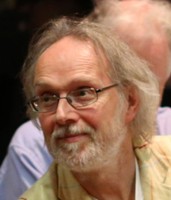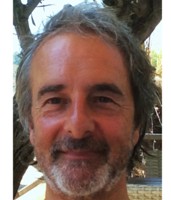


As the days grow shorter (here in the northern hemisphere) it’s a pleasure to welcome our readers to a bumper issue of the journal that is without doubt the longest in this journal's auspicious 44-year history. The issue begins by focusing on Guest Editor Martin Levy’s expertly assembled theme symposium, on the seminal and still inspirational figure of Paul Goodman. Among his many other wide-ranging accomplishments, Goodman was also one of the founders of Gestalt Therapy; and his theoretical contribution to ‘PHG’, as it is affectionately known in the Gestalt world, remains one of the boldest, as well as most articulate, renderings of psychological theory in the Humanistic Psychology field. It was therefore high time that we in the wider Humanistic Psychology world took the opportunity to review, reassess and celebrate Goodman’s life and contribution. We’ll leave Martin to introduce the many delights on offer, which include poems by, and rarely seen photos of, Paul.
Speaking of contributions, I (David) know of no one – and I’m sure I’m not alone in this – who has made a more significant and substantial contribution to the Humanistic Psychology field, and especially to this journal and to the AHPb, in recent years, than my fellow editor Richard House. Richard is, to my mind, the very embodiment of the term ‘spiritual activist’, and it has been a huge joy and privilege to work alongside him for these past few years. His brilliance of mind, honesty and integrity, humour, effectiveness and sheer indefatigability of spirit have helped transform Self & Society, and assisted also in keeping AHPb afloat in very challenging times. I am delighted that he will be staying on as an Associate Editor, where he will prove of inestimable value in helping us to maintain the high standards and quality that S&S has come to represent in the psy field.
How fitting therefore in this his final issue at the helm, that we also include a long and profoundly interesting (we’re sure you'll agree) interview with his, and one of my, all-time musical heroes – the legendary UK-born jazz guitarist John McLaughlin. One of Richard’s many gifts is that of dreaming big and making the impossible happen: here’s one example of that (don’t ask!). (And it would be no great surprise to many of us if, in his next incarnation, he actually does succeed in helping Jeremy Corbyn become Britain's next Prime Minister!) We have created a unique ‘musical symposium’ centred on the interview with John McLaughlin, which includes retro reviews of one of John's classic albums from 1971, ‘My Goal's Beyond’ (reviewed by the editors); a poem by Julian Nangle; and Robert Sardello's regular column devoted to music and John's interview.
Richard adds: David wrote those very kind earlier words about me before I had a chance to edit them out! – hey-ho. I couldn’t ask for a higher accolade than to be labelled as a ‘spiritual activist’ – thank you, David. And how fitting that I should depart the editorship of S&S with a sensational interview with the ‘spiritual activist’ par excellence who has inspired me all my adult life – the incomparable John McLaughlin. And how generous of our publishers, Routledge, to allow free access to this wonderful interview with its many profound insights into the art and spirit of the musical path. My abiding hope is that this interview will not only delight John’s countless thousands of fans worldwide, but that it will bring the great man’s work to the attention of our psy field in a way that will inspire further writings, and deeper connections between music and Humanistic Psychology and the psy therapies.
I must also add that David Kalisch (and, previously, Jennifer Maidman) have been a delight to work with, not least in relation to their patience with my sometimes chronic last-minute-itis. It’s been a pleasure to work with you both to make this journal what it is today. Routledge’s Jenny Kidd, Vishani Perera and Adam Burbage also deserve a special mention for the way they have welcomed our journal into the Taylor and Francis ‘fold’ with their warmth and professional excellence. The world we now inhabit arguably needs the values and practices of Humanistic Psychology more than it has ever done – and we know that whoever ends up in the relinquished co-editor’s chair (see the Stop Press addition, below) will continue the proud tradition of this journal’s near half-century’s contribution to humanizing the field of Psychology.
But back to more important issues – the contents of our winter issue! We also have an outstanding Articles section, with two telling contributions on the psy dimensions of neoliberalism and austerity by Philip Thomas and Paul Atkinson; a piece by David L. Collins on that perennial classic The cloud of unknowing; an exciting article by Grethe Hooper Hansen on un- and para-conscious learning and the much-neglected work of Georgi Lozanov; and a piece on Israel/Palestine dialogue from Andrew Samuels.
We also include two mini-symposia on two important books: an old classic, Governing the Soul, with a retro review by Bruce Scott and a commentary-response by the book’s author Nikolas Rose; and a new offering from John Lees on The Future of Psychological Therapy, with reviews by Martin Polecoff and Adrian Hemmings and a commentary-response from John.
We also have two extensive conference reports: one by Hank Earl on ‘The Establishment on the Couch’ conference, focusing in particular on Boarding School Syndrome; and a ‘report-article’ on a Trades Union Congress (TUC) conference workshop on mental health under austerity by Richard House, Rich Moth, Debbie Porteous and Guy Jamieson.
We also feature two moving and joyful appreciations of the rich life of the extraordinary Ursula Fausset, lovingly written by Malcolm Parlett and Gaie Houston.
Additionally, we have our regular columns, including another contribution to our occasional ‘Roots’ series by Aron Gersh, former editor of Human Potential magazine; the welcome return of Stuart Morgan-Ayres’ political diary, following a short break; Manu Bazzano’s always-engaging book reviews section; another poem by Peter Ryan; and last but not least, an interesting extended letter from Jim Robinson responding to our Depressive Realism theme symposium from the summer issue. And this richest of fare is rounded off with a retro-review by Shani Bans of Jacques Derrida’s classic text The post card.
All in all, then, we believe that Richard departs the co-editorship on what is truly a high note, with S&S now firmly established and on sound footings as an eminent scholarly journal, a journal with a critical edge, and one that’s definitely not in hock to the establishment or to the consensus: in other words, a still vital read. We hope you agree.
David and Richard
Stop Press: Our New Co-editor, Dr Gillian Proctor
I am delighted to introduce myself as the new co-editor of Self and Society. It’s the perfect journal for me, with a readership of practitioners ensuring all content is directly relevant to practice. At the same time, it maintains an academic profile with a few peer-reviewed articles per issue. It is the ideal platform for theory/research informing practice and vice versa. I love the diversity of writing styles and the lack of necessity to conform to usual academic writing, allowing for much more creativity and the art of psychotherapy to shine through. I am particularly passionate about the links with politics, society and social justice, which I am keen to preserve and strengthen. I am hoping to develop more of a student writing presence in the journal, both to increase the student readership and encourage student writers to develop.
I am currently the programme leader of the MA (Masters) in relational and integrative counselling at the University of Leeds and have a small private practice. I am particularly interested in the cross-overs between relational psychoanalysis and humanistic practice. I previously worked at the University of Nottingham, being involved in training counsellors working in IAPT (Improving Access to Psychological Therapies) in ‘counselling for depression’ (CfD – Sanders & Hill, Citation2014). Previous to that, I worked in the National Health Service for 22 years, as a Clinical Psychologist and person-centred therapist. I worked in adult mental health, forensic services and primary care services which became IAPT. How our work is influenced by social, political and organizational contexts, and how we negotiate value and ethical conflicts within this, are current research interests of mine (see Proctor, Citation2015). My approach to therapy is fundamentally person-centred (Rogers, Citation1959), as this suits my values and allows me to practise ethically for me. I am interested in how our values determine what we do in therapy far more than any modality description, and I believe that being able to articulate how our values determine our decisions is important for ethical practice (Proctor, Citation2014). I look forward to working with you and hopefully hearing from many of you.
References
- Proctor, G. (2014). Ethics and values in counselling and psychotherapy. London: Sage.
- Proctor, G. (2015). The NHS in 2015. Therapy Today, 26 (9), 18–25.
- Rogers, C. R. R. (1959). A theory of therapy, personality and interpersonal relationships as developed in the client-centered framework. In S Koch (Ed.), Psychology: A study of a science, Vol. III: Formulations of the person and the social context (pp. 184–256). New York and London: McGraw-Hill.
- Sanders, P., & Hill, A. (2014). Counselling for depression: A person-centred and experiential approach to practice. London: Sage.
